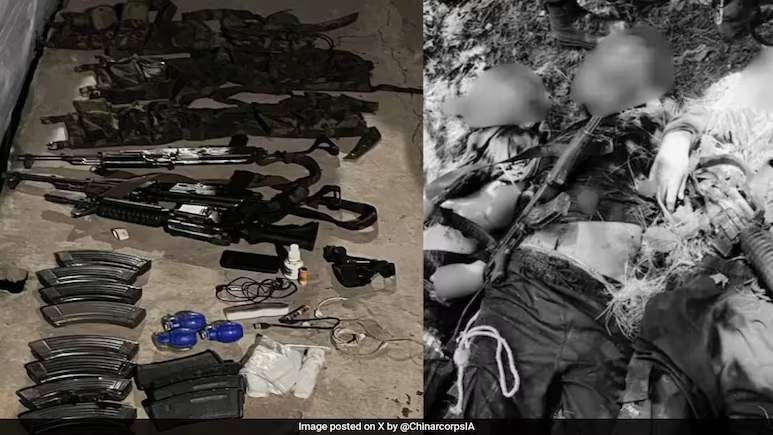Operation Mahadev: A Major Blow to Cross-Border Terrorism
Operation Mahadev, a high-stakes military operation carried out on the outskirts of Srinagar, has marked a major counter-terrorism success for Indian security forces. This operation not only neutralized the terrorists responsible for the Pahalgam terror attack but also exposed an elaborate cross-border conspiracy involving sophisticated international weaponry and logistic networks.

Background: The Pahalgam Massacre
Earlier this month, the peaceful region of Pahalgam in Jammu and Kashmir was rocked by a horrific terror attack that left 26 innocent civilians dead in Baisaran Valley. The brutality of the incident shocked the entire nation, and urgent calls for justice echoed from all corners.
The Union Home Minister, Amit Shah, confirmed in Parliament that the perpetrators of the massacre were three Pakistani terrorists—Suleiman, Afghan, and Jibran—who were eliminated in a precision military operation now named Operation Mahadev.
The Terrorists: Pakistani Nationals Identified
The identity of the terrorists was verified through a combination of human intelligence and physical evidence. According to Home Minister Shah:
- All three were Pakistani nationals, confirmed via Pakistani voter identity cards found on them.
- Pakistan-made chocolates and other food items were recovered from their bodies.
- Identification was also corroborated by locals who had earlier been detained for supplying rations to the group.
Their deaths bring closure to the families affected by the Pahalgam massacre and signal India’s resolve in its fight against cross-border terrorism.
The Weapons Recovered: A Web of Global Conspiracy
The operation unearthed a chilling international nexus, as the weapons seized from the terrorists included:
- Romanian Model 90 (AKMS) – 7.62 mm under-folding stock rifle, often used by non-state actors.
- Hybrid Russian AKM 7.62 Assault Rifle – Modified for tactical flexibility.
- American M4 Commando (Colt Model 933, 5.56 mm) – A compact, NATO-standard weapon often used by elite units.
These firearms were flown to Chandigarh for ballistic testing. Late-night forensic analysis confirmed that the same weapons were used in the Pahalgam killings.
Implication: A Strategic Cross-Border Network
According to intelligence sources:
- The combination of weapon origins—Romania, Russia, and the USA—indicates a well-structured and funded terror network.
- The use of M4 Commando, in particular, suggests military-grade logistics were employed in supplying arms to the militants.
- The weapons and evidence clearly point to external state support or at the very least, a coordinated international supply chain aiding terrorist operations inside India.
Execution of Operation Mahadev
The operation was carried out as a joint mission by the Indian Army, Central Reserve Police Force (CRPF), and Jammu and Kashmir Police. According to reports:
- The three terrorists had been under surveillance for several days.
- They attempted to communicate using a highly encrypted communication platform, which eventually led to their location being triangulated.
- Their position was confirmed in the Dachigam forest area, after which a swift operation was launched.
The terrorists were engaged in a fierce gunfight but were ultimately neutralized by Indian forces without any loss of life on the side of the security forces.
Aftermath: Heightened Vigilance and Continuing Search Ops
Though the three terrorists have been eliminated, intelligence agencies believe that they were part of a larger plan to destabilize the region further. Search operations are still ongoing in Dachigam and nearby areas to ensure no sleeper cells or weapons caches remain undetected.
Additionally, investigations are underway to trace how such advanced weaponry entered Indian soil, and whether foreign intelligence networks were involved in aiding and abetting the terrorists.
Conclusion
Operation Mahadev stands as a strategic victory in India’s ongoing war against terrorism. It not only avenged the Pahalgam massacre but also unraveled a dark web of international terror logistics and exposed the blatant involvement of Pakistan-based terrorists in disrupting peace in Kashmir. This operation reinforces the commitment of Indian security forces to proactively eliminate any threat to national security.




![Prayas-तेजस [UPSC CSE Sociology Optional] – Online & Offline](https://theprayasindia.com/wp-content/uploads/2025/09/Prayas-तेजस-UPSC-CSE-Optional-Subject-The-Prayas-India-300x300.png)
![Prayas-सूत्र [UPSC CSE Materials (Hardcopy)]](https://theprayasindia.com/wp-content/uploads/2025/09/Prayas-सूत्र-UPSC-CSE-Study-Materials-Hardcopy-The-Prayas-India-300x300.png)
![Prayas-मंत्रा [UPSC CSE CSAT]](https://theprayasindia.com/wp-content/uploads/2025/09/Prayas-मंत्रा-UPSC-CSE-CSAT-The-Prayas-India-300x300.png)
![Prayas सारथी [UPSC CSE One on One Mentorship]](https://theprayasindia.com/wp-content/uploads/2025/09/Prayas-सारथी-UPSC-CSE-One-on-One-Mentorship-The-Prayas-India-300x300.png)










